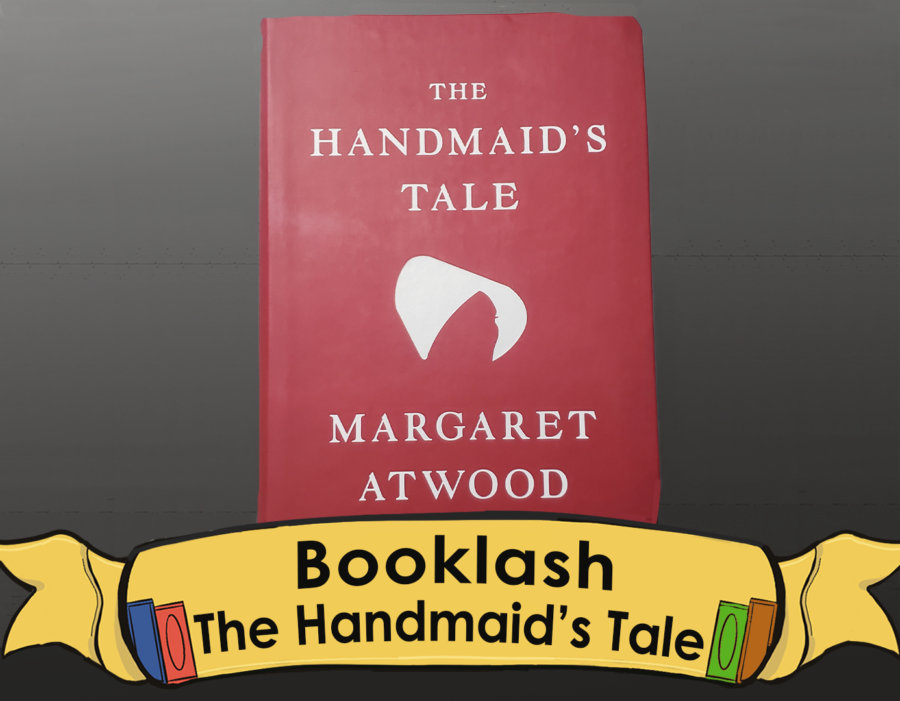BookLash: Is “The Handmaid’s Tale” a scary prediction of the future?
Photo credit/ Jen Flynn
“The Handmaid’s Tale” is as controversial today as when it was first published, but is this controversy justified?
Booklash is a column exploring the history of Banned Books in the United States, the reasons behind the arguments, and a student’s take on this attack on literature.
Margaret Atwood wrote the classic novel “The Handmaid’s Tale” in 1985, sparking people to ban and challenge the novel as early as the 1990s.
One may think the clear reason for this outcry would be due to explicit sex scenes deemed inappropriate for children. However, the public hatred of this novel goes far beyond sexual content and language.
Reasons this novel has been banned and challenged include: sexuality, profanity, suicide, violence, and an anti-Christian theme. “The Handmaid’s Tale” provokes controversial arguments by approaching issues on sex, religion, reproductive rights, feminism, and fundamentalism. The criticisms the book explores on these topics are as relevant and controversial today as they were when the book was first published.
To this day, people either hate or love this novel, often using the lessons within the pages to benefit movements and political arguments. For example, a group of women protested against anti-abortion bills in Texas by wearing the same red capes and white bonnets that the handmaid’s were forced to wear in the novel, emphasizing their fight for reproductive rights by symbolizing characters who were stripped of all such rights.
In “The Handmaid’s Tale”, women did not have a say in what happened to their bodies, merely becoming concubines for reproductive means. For many, this is symbolic of the government continuously trying to minoritize women.
In the religious community, Christians find this novel offensive, believing that the novel’s viewpoint of extremist Christian beliefs fueling the violation of human rights and subjugation of women is an attack on their religion. Atwood incorporates quotes from the Bible to justify some of the novel’s ideas on forced pregnancy and the mistreatment of women, which modern Christians may believe to be a twist of words and misuse of the Bible.
However, Atwood is not aiming to give an accurate description of modern day Christianity, but is rather showing the impact that religion can have when mixed with politics.
In a world known for wars between religions and countries, is Atwood’s fictional world that absurd to believe? Did a whole race not get decimated during WWII because of their religious preferences and personal appearances? Sure we say we are beyond such mindless cruelties, but are we truly? To this day we fight for our rights, we fight for equality, and we fight for a better world.
Those who love “The Handmaid’s Tale” view the novel as a symbol of realistic fear; fear of losing a child, loss of independence, rape, violence, subjugation at the hands of men, and being thought of as less than for being childless. This novel turns these fears into a reality that is fathomable to the reader.
Despite the difficult topics covered in the novel, some people are taking the lessons to heart, finding the novel as a premonition of a not entirely impossible future. In any case, the novel is a big advocate for women’s rights, bringing to light womens’ biggest fears and nightmares in a men dominated society.
If the haters outnumbered the lovers, “The Handmaid’s Tale” never would have seen the big screen, being turned into a movie, an opera, and most recently a popular television series.
For those who love the television series, I would suggest reading the novel that started it all, where all the feelings and emotions the author intended can be fully experienced and appreciated. Despite the haters, “The Handmaid’s Tale” stands strong, providing a scary premonition for women to heed lest all our rights diminish over time.
Contact the writer:
[email protected]

Amanda Morgan is a senior here at Marywood full of aspirations, double majoring in English Writing and English Literature, as well as pursuing her master's...













